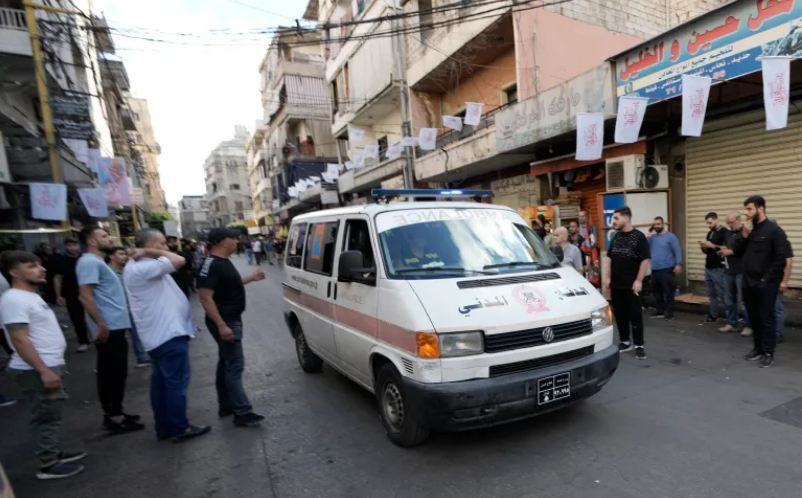At least 32 people, including two children, were killed and thousands more injured, many seriously, after communication devices, some used by the armed group Hezbollah, dramatically exploded across Lebanon on Tuesday and Wednesday.
In the latest round of blasts on Wednesday, exploding walkie-talkies killed 20 and injured at least 450 people, according to Lebanon’s health ministry. The explosions occurred in the vicinity of a large crowd that had gathered for the funerals of four victims of Tuesday’s simultaneous pager blasts, which killed at least 12 people and injured nearly 3,000.
BBC teams in the city reported chaotic scenes in which ambulances struggled to reach the injured, and locals became suspicious of anyone using a phone.
The explosions deepened unease in Lebanese society, coming a day after the apparently similar and highly sophisticated attack targeting thousands of pagers used by Hezbollah members. The militant group blamed its adversary, Israel. Israeli officials have so far declined to comment. Two firms based in Taiwan and Hungary, accused in media reports of manufacturing the pagers, have both denied responsibility. A Japanese company that makes the walkie-talkies said it stopped producing that model 10 years ago.
How did the attacks unfold?
The first round of blasts started in Beirut, Lebanon’s capital, and several other areas of the country at about 15:45 local time (13:45 BST) on Tuesday. Witnesses reported seeing smoke coming from people’s pockets, followed by small explosions resembling fireworks and gunshots.
According to US officials cited by the New York Times, pagers received messages that seemed to come from Hezbollah’s leadership before detonating. The messages instead appeared to trigger the devices, the outlet reported. Explosions continued for about an hour after the initial blasts, as per the Reuters news agency. Soon after, numerous people began arriving at hospitals across Lebanon, with witnesses reporting mass confusion in emergency departments.
Similar scenes played out across the country in another round of blasts on Wednesday, at around 17:00 local time (15:00 BST). Reports suggest that walkie-talkies were blown up, devices that were purchased by Hezbollah five months ago, according to a security source speaking to Reuters news agency. At least one explosion was close to a funeral being held in Beirut for some of the victims of Tuesday’s attack, creating panic among those near the procession. Twenty people have been killed and at least 450 injured, according to Lebanon’s health ministry.
What do we know about the devices?
Details about the walkie-talkies detonated in Wednesday’s explosions are still coming to light. Footage shot in the aftermath showed destroyed devices bearing the brand Icom, a Japanese company.
A statement from the firm describes the IC-V82 model as a handheld radio that was exported to the Middle East from 2004 to 2014 and has not been shipped since then. Icom said production on that model stopped 10 years ago. The manufacturing of the batteries has also stopped, it says.
The company says it is not possible to confirm whether the IC-V82s that exploded in yesterday’s attacks were shipped directly from Icom or via a distributor. It said any products for overseas markets were sold only to the firm’s authorized distributors. However, the models may not even be from Icom.
Earlier, a sales executive at the US subsidiary of Icom told AP news agency that the devices that exploded in Lebanon appeared to be knock-off products – adding that it was easy to find counterfeit versions of the product online. The pagers that exploded on Tuesday were a new brand that the group had not used before, one Hezbollah operative told AP.
A Lebanese security official told Reuters that around 5,000 pagers were brought into the country about five months ago. Labels seen on fragments of exploded pagers point to a pager model called the Rugged Pager AR-924. But its Taiwanese manufacturer Gold Apollo has denied any involvement with the explosions. When the BBC visited Gold Apollo on Wednesday, local police were searching the company’s offices, inspecting documents, and questioning staff.
Taiwan pager maker stunned by link to Lebanon attacks The founder, Hsu Ching-Kuang, said his company had signed an agreement with a Hungarian-based company – BAC – to manufacture the devices and use his company’s name.
He added that money transfers from them had been “very strange”, without elaborating. BBC Verify has accessed BAC’s company records, which reveal it was first incorporated in 2022. Its CEO, Cristiana Bársony-Arcidiacono, told NBC that she knew nothing about the explosions. “I don’t make the pagers. I am just the intermediate. I think you got it wrong,” she said. The Hungarian government said the company had “no manufacturing or operational site” in the country.


Comments are closed, but trackbacks and pingbacks are open.